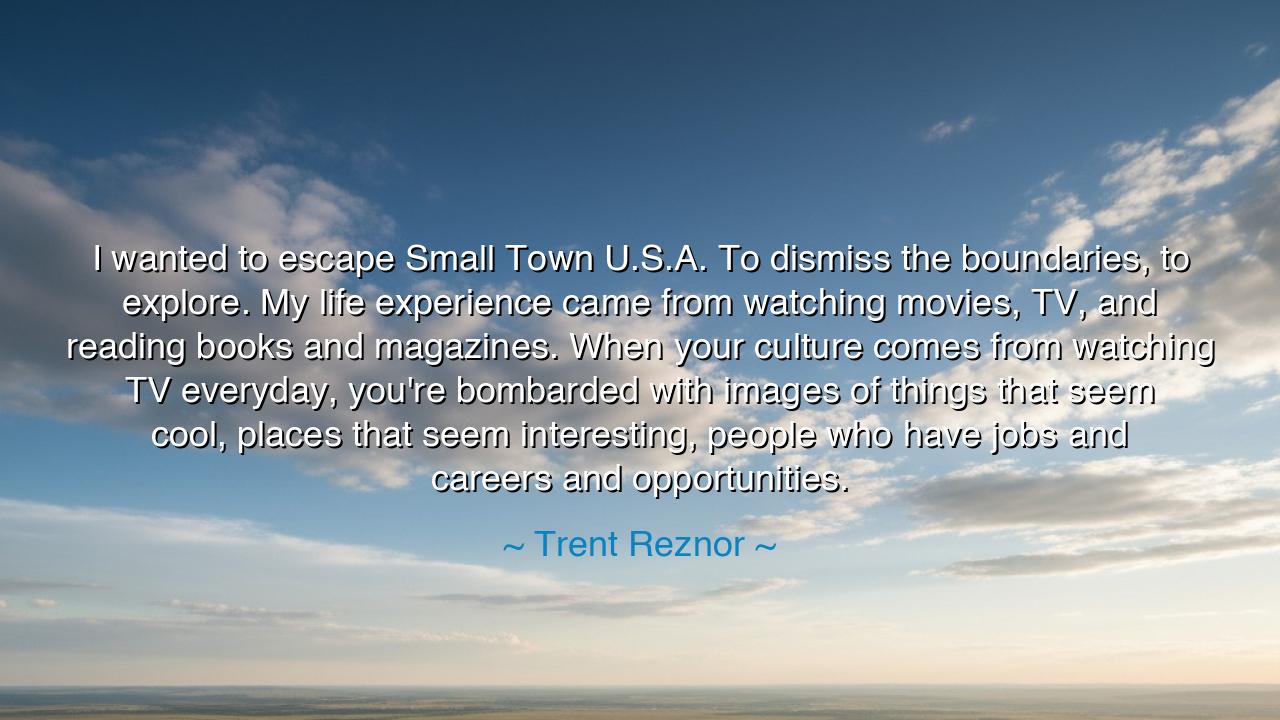
I wanted to escape Small Town U.S.A. To dismiss the boundaries
I wanted to escape Small Town U.S.A. To dismiss the boundaries, to explore. My life experience came from watching movies, TV, and reading books and magazines. When your culture comes from watching TV everyday, you're bombarded with images of things that seem cool, places that seem interesting, people who have jobs and careers and opportunities.






Trent Reznor’s words strike at the very heart of human ambition and longing. “I wanted to escape Small Town U.S.A. To dismiss the boundaries, to explore. My life experience came from watching movies, TV, and reading books and magazines. When your culture comes from watching TV every day, you're bombarded with images of things that seem cool, places that seem interesting, people who have jobs and careers and opportunities.” These words are not merely a reflection of Reznor’s personal journey; they are a powerful testimony to the universal human desire to escape limitations, to seek something beyond the confines of one’s immediate world.
The ancients, too, were no strangers to this longing. The Greeks and Romans were constantly searching for ways to expand their horizons, both physically and intellectually. Consider the great Alexander the Great, whose empire spanned continents, driven by the vision of conquering unknown lands and exploring new cultures. Alexander, though born into royal privilege, felt the same urge to escape the borders of his kingdom, to explore the world and make his mark upon it. Just as Reznor felt the pull of a wider, more exciting world beyond his small town, so too did the ancient warriors, poets, and philosophers seek to explore not just physical lands, but also the depths of human experience and knowledge.
Reznor’s words highlight the role of media in shaping our perceptions of the world. The bombardment of images, stories, and ideals through movies, TV, books, and magazines becomes a lens through which we see possibility. This cultural conditioning, as Reznor describes it, forms the foundation of many dreams and desires. The ancients, too, were influenced by their stories—whether it was Homer’s tales of heroism, Plato’s discussions on ideals, or the exploits of Julius Caesar, they too were shaped by the stories that circumscribed their world. Cultural narratives have always been the vehicle for expanding the mind and the imagination, pushing individuals to transcend the limitations of their environment and seek something greater.
The power of media and stories is not simply in the images they present, but in their ability to create aspirations. Reznor speaks of the way these stories—of cool places, careers, and opportunities—serve as a beacon of hope for those looking to escape their small world. In a similar vein, the ancient mythologies served as a map for the soul, offering heroes to emulate, battles to fight, and destinies to claim. Just as Achilles fought for honor and Odysseus sought to return home, so too does the modern individual fight to escape the small confines of their own world, hoping to find glory and purpose in a larger, more dynamic world.
But there is a caution here. While the desire to escape is natural, and the longing to experience something more is universal, there is always the danger of becoming too enamored with the idea of escape and neglecting the life we have. Consider Diogenes, the ancient Greek philosopher who chose to live in a barrel rather than pursue fame or wealth. Diogenes rejected the popular narratives of success, choosing instead to live in alignment with his values. He recognized that true freedom was not found in escape, but in acceptance of oneself and the world as it is. Though he may have seemed the antithesis of the aspirational hero, his rejection of societal norms served as a profound statement on the nature of contentment and authenticity.
The lesson, then, is clear: the desire to escape can fuel our ambition and spark our journeys, but we must never lose sight of the value of the world around us. Reznor’s desire to break free from the confines of his small-town existence mirrors the universal yearning to grow, to expand one’s horizons. However, we must ask ourselves: What is it we are truly seeking? Is it merely the allure of a broader world, or is it a deeper, more profound sense of purpose? Like Alexander, we may journey far and wide, but let us not forget that it is not the destination that makes us who we are, but the choices we make along the way.
Thus, the practical action is to embrace exploration, but also to recognize that contentment and growth are not solely dependent on escape. Let us use the stories and images that inspire us as tools for self-discovery and transformation, rather than as mere distractions from the life we have. Whether we are seeking new places, new experiences, or new career opportunities, we must remember that the journey is as important as the destination. Let the desire to explore be tempered by the wisdom to appreciate the journey’s lessons and the strength to live authentically in whatever world we choose to inhabit.






AAdministratorAdministrator
Welcome, honored guests. Please leave a comment, we will respond soon